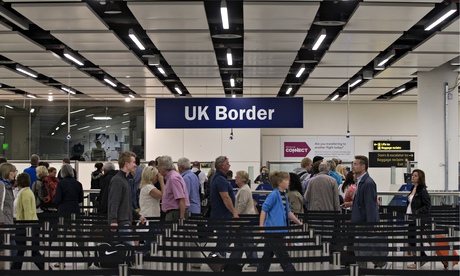
The government has sought to ease fears over the risk of Ebola to the British public as it resisted mounting pressure to screen people arriving at UK ports and airports.
“There’s no need for hysteria or panic of that kind,” the defence secretary, Michael Fallon, said in a round of broadcast interviews. “Every GP surgery, every hospital in the country knows how to handle this, how to check for symptoms. I think we need to be calm and measured about this and just make sure that if symptoms are identified that people get to be checked as quickly as possible.”
Fallon also rejected calls to introduce screening. Although the Ebola outbreak was not under control in west Africa, he said there was no need for such measures at the UK border.
“The World Health Organisation advises that screening is best done when you leave a country, when you leave Sierra Leone or leave Liberia or Guinea, rather than the country you come into,” he said. “There are no direct flights at the moment from Sierra Leone to Britain, so it’s not possible to be 100% sure of everybody who’s coming here.”
Fallon repeated assurances from UK health experts that Britain has robust procedures in place at GP surgeries and in hospitals to make sure that if any symptoms are detected, people know what to do and the situation is dealt with very quickly.
Britain announced on Wednesday that 750 military personnel and the medical ship RFA Argus would be sent to west Africa to help contain the outbreak.
“It’s going to be several months before we reverse the trend and see the number of cases actually declining,” said Fallon. “We have to assist these governments which are overstretched at the moment in getting this under control and getting the number of patients going down, and that’s the purpose of the military deployment we authorised yesterday.”
Keith Vaz, the chairman of the influential home affairs select committee, has called for tests at airports, train stations and ports, and greater support for immigration officers to make sure they have the training to deal with the outbreak, which has killed 3,879 people in Sierra Leone, Liberia and Guinea.
“Our immediate response should be to tighten regulation and introduce measures such as screenings at airports, train stations and ferry ports to ensure that this deadly disease cannot take more lives,” Vaz said. “Immigration officers are not trained health professionals. Greater support must be offered to ensure that they are equipped to deal with this outbreak to prevent it reaching the UK.”
The US and Canada announced increased airport screening measures to look for passengers carrying Ebola on Wednesday. Washington’s measures were announced hours after Thomas Duncan died in a Dallas hospital after arriving from Liberia with Ebola. He had lied in a questionnaire about whether he had been in contact with anyone affected by the disease.
Barack Obama, however, appeared to cast doubt on the efficacy of the procedures.
“These measures are really just belt-and-suspenders,” the US president told state and local officials on Wednesday. “It’s an added layer of protection on top of the procedures already in place at several airports.”
The extra screening would probably not have worked in Duncan’s case when he arrived from Liberia last month because he had no symptoms while travelling.
Public Health England said there were no plans to introduce entry screening for Ebola in the UK.
“This would require the UK to screen every returning traveller, as people could return to the UK from an affected country through any port of entry. This would be huge numbers of low risk people. PHE has provided UK Border Force with advice on the assessment of an unwell patient on entry to UK.”
There are 40 flights a week arriving in the UK from three west African countries – Nigeria, Ghana and Gambia. British Airways recently suspended flights between Britain and Liberia and Sierra Leone because of the “deteriorating public health situation” in the two countries.
Under the measures announced by the US, agents will escort passengers arriving from the three worst affected countries to an area of the airport set aside for screening, according to a fact sheet provided by the Centers for Disease Control and Prevention.
US Customs and Border Protection officers will ask the travellers a series of questions about their exposure to Ebola and trained medical personnel will take their temperature with a non-contact thermometer. If travellers show signs of having Ebola or indicate they have had exposure to the disease, they will be placed at an airport quarantine station and evaluated.
The administration has said repeatedly that it is not considering a ban on travel to or from the west African countries affected by the outbreak, as it could make the situation worse by preventing desperately needed resources from reaching the region.
“What we’re paying for now is our failure to have invested in those countries before,” said Francisco Ferreira, the World Bank’s chief economist for Africa. They had only minimal health facilities even before Ebola hit.
Jim Kim, the president of the World Bank, has said the international community had “failed miserably” in its response to the Ebola virus.
